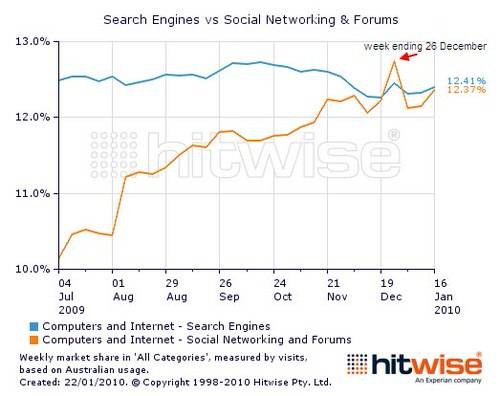It’s often said these days that Google and Facebook are major rivals, but how could that be if one is in search and the other, social networking? Traffic analyst firm Hitwise provided one very clear clue tonight when it published new numbers for web user activity in Australia. For perhaps the first time ever, social networking sites have surpassed the traffic search engines receive, Hitwise says. There is reason to question the company’s categorization of web traffic, but the trend is worth examining none the less.

Social networking climbed fast this year, and Hitwise says it just peaked over search for a few days during the communication frenzy of Christmas. Take that, Larry and Sergey – Mark and Ev are right behind you.

The biggest problem with Hitwise’s numbers is that the company appears to include YouTube in the “social networks and forums” category that is challenging search. That’s a questionable categorization of (Google’s) YouTube, a site that some people call the 2nd-largest search engine on the web. A person certainly can use YouTube as a social network – but we’d guess that far more people use it as a search engine. If YouTube is growing (and this analysis says it is) then search is growing. You wouldn’t think search would have much room to grow, but YouTube demonstrates nicely that there can emerge new kinds of search at any time. Some people argue that real-time search is the next type that will emerge as a growth industry for the search market. Others point to social search and that kind of amalgamation could throw our search vs. social networking equation entirely!
The arguable mischaracterization of YouTube seems to throw a big monkey-wrench in Hitwise’s usually fabulous market analysis, but as a general trend social network is undoubtedly growing. At 2% of web use, according again to Hitwise, YouTube is a major player – but lets think about the rise of actual social networking sites relative to search.
What would it mean if social networking over-took search in terms of sheer visits online? It would mark a sea-change on the internet. No longer would our dominant use of the web be seeking out web-pages built by HTML web-masters! Now we would all be publishing tiny little updates that perhaps only our friends and family care about. We’d be subscribing, more than we ever did by RSS, to syndicated updates from organizations of interest, large and small. It would be (perhaps will be) a very different era and, to be frank, it’s going to be harder to monetize. There will be privacy battles. There will be new platforms for innovation.
It’s a pretty big deal. Things will really change if current trends continue and social networking rises to the top. That’s not as clear as this traffic analyst firm argues that it is, but it could happen. And that’s a big reason why Google and Facebook are rivals.
Classic post: Is YouTube the Next Google?
Check out our research report The Real-Time Web and Its Future.
















